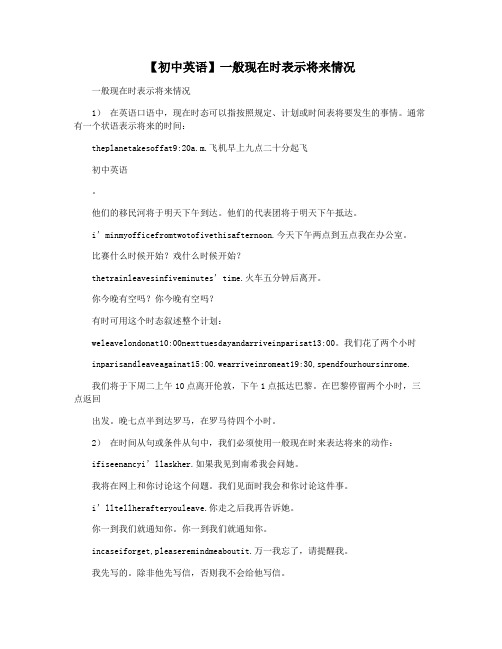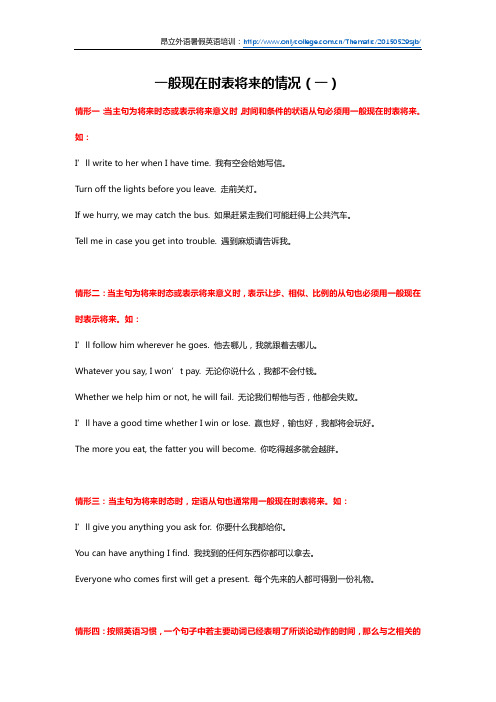(完整版)一般现在时表将来的几种情况
表示将来的时态(一般现在时表将来,现进表将来以及一般将来时)

一般现在时
在时间和条件状语从句中可用一般现在时代替
一般将来时。 I’ll let you know as soon as I hear from him. 我一接到他的信就告诉你。
现在进行时
有些动词,如come, go, leave, return, arrive,
begin, start等,它们的现在进行时可表示不远 的将来要发生的事情。例如: Flight 1095 is landing soon. 第1095号航班马上要着陆了。
Байду номын сангаас(
)5. Look! Some visitors __ for the bus over there. (2015南宁) A. are waiting B. is waiting C. waiting D. Wait
( (
) 6. ---What were you doing at 5:30 yesterday afternoon? --- I ______ with Sam.(2016 钦州) A. walk B. walks C. was walking D. walked )7. — What are you going to do tomorrow?(2014 柳州) — I ______ visit my aunt. A. went to B .go to C. am going to
一般将来时
一般将来时是表示从现在开始将来要发生的事。 肯定句构成: be going to do sth. will / shall do sth. 其中 will 可用于任何人称, 而 shall 只可以用于第一人称 三.否定句及一般疑问构成: 1. be going to do sth. 在be动词后面加not;一般疑问句将be动词 放在句首。 2. 2. will / shall do sth.否定结构在 will 后加 not, 缩写为 won’t ;一般疑问句将 will 提放句首。 四、常用的时间状语: tomorrow, next week, soon, in the future, in two days等等。
一般现在时表将来-现在进行时表将来

一般现在时表将来一.“主将从现”原则当主句为将来时态或表示将来意义时,时间和条件的状语从句必须用一般现在时表将来:I’ll write to her when I have time。
我有空会给她写信。
Turn off the lights before you leave。
走前关灯.二除表示时间和条件的状语从句外,表示让步、相似、比例的从句也必须用一般现在时表将来:I’ll follow him wherever he goes。
他去哪儿,我就跟着去哪儿。
三.在make sure(弄清楚),make certain(弄清楚),take care(注意,当心),be careful(注意,当心),mind(注意),watch(注意)等后的that从句中通常也只用一般现在时表将来意义:We must take care that no one sees us。
我们必须注意别让人看见三.表示按规定、时间表、计划或安排要发生的动作:The train leaves at 12:00。
火车12点开出。
四.表示客观性很强的将来My birthday is on a Sunday this year. 我今年的生日在星期天。
五.在it doesn't matter,I don't care,I don’t mind 等结构(以及类似结构)后的名词性从句也通常用一般现在时表将来意义:It doesn’t matter where we go on holiday. 我们去哪儿度假都行。
六.在I hope ,I bet,see (to it)等后的宾语从句中通常用一般现在时表示将来意义,但有时也可直接用将来时态:I hope that you like [will like]it. 你希望你会喜欢它七.有时说话者对某一将来事实非常肯定,也用一般现在时:Final victory is ours。
一般现在时表将来的规律教学教材

一般现在时表将来的规律一般现在时表将来的规律一、“主将从现”原则当主句为将来时态或表示将来意义时,时间和条件的状语从句必须用一般现在时表将来:I’ll write to her when I have time. 我有空会给她写信。
Turn off the lights before you leave. 走前关灯。
If we hurry, we may catch the bus. 如果赶紧走我们可能赶得上公共汽车。
Tell me in case you get into difficulty. 遇到困难请告诉我。
【注】① 除表示时间和条件的状语从句外,表示让步、相似、比例的从句也必须用一般现在时表将来:I’ll follow him wherever he goes. 他去哪儿,我就跟着去哪儿。
Whatever you say, I won’t pay. 无论你说什么,我都不会付钱。
Whether we help him or not, he will fail. 无论我们帮他与否,他都会失败。
I’ll have a good time whether I win o r lose. 赢也好,输也好,我都将会玩好。
The more you eat, the fatter you will become. 你吃得越多就会越胖。
② 另外,当主句为用将来时态时,定语从句也通常用一般现在时表将来:I’ll give you anything you ask for. 你要什么我都给你。
You can have anything I find. 我找到的任何东西你都可以拿去。
Everyone who comes first will get a present. 每个先来的人都可得到一份礼物。
二、简化原则按照英语习惯,一个句子中若主要动词已经表明了所谈论动作的时间,那么与之相关的其他动词就不必再次指明同一时间,而往往使用一个比较简单的时态,如用一般现在时表示一般将来时等。
【初中英语】一般现在时表示将来情况

【初中英语】一般现在时表示将来情况一般现在时表示将来情况1)在英语口语中,现在时态可以指按照规定、计划或时间表将要发生的事情。
通常有一个状语表示将来的时间:theplanetakesoffat9:20a.m.飞机早上九点二十分起飞初中英语。
他们的移民河将于明天下午到达。
他们的代表团将于明天下午抵达。
i’minmyofficefromtwotofivethisafternoon.今天下午两点到五点我在办公室。
比赛什么时候开始?戏什么时候开始?thetrainleavesinfiveminutes’time.火车五分钟后离开。
你今晚有空吗?你今晚有空吗?有时可用这个时态叙述整个计划:weleavelondonat10:00nexttuesdayandarriveinparisat13:00。
我们花了两个小时inparisandleaveagainat15:00.wearriveinromeat19:30,spendfourhoursinrome.我们将于下周二上午10点离开伦敦,下午1点抵达巴黎。
在巴黎停留两个小时,三点返回出发。
晚七点半到达罗马,在罗马待四个小时。
2)在时间从句或条件从句中,我们必须使用一般现在时来表达将来的动作:ifiseenancyi’llaskher.如果我见到南希我会问她。
我将在网上和你讨论这个问题。
我们见面时我会和你讨论这件事。
i’lltellherafteryouleave.你走之后我再告诉她。
你一到我们就通知你。
你一到我们就通知你。
incaseiforget,pleaseremindmeaboutit.万一我忘了,请提醒我。
我先写的。
除非他先写信,否则我不会给他写信。
3)还有一些其他从句中,可以用一般现在时表示将来动作:我希望你感觉更好。
我希望你很快就会好起来。
assumingitrainstomorrow,whatshallwedo?假定明天下雨,我们该怎么办?不管花多少钱,我都会解决这个问题。
在什么情况下会用一般现在时表将来精编版

……………………………………………………………最新资料推荐…………………………………………………在什么情况下会用一般现在时表将来?下列动词:come, go, arrive, leave, start, begin, return的一般现在时表将来。
这主要用来表示在时间上已确定或安排好的事情。
The train leaves at six tomorrow morning.When does the bus star? It stars in ten minutes.倒装句,表示动作正在进行,如:Here comes the bus. = The bus is coming.There goes the bell. = The bell is ringing.在时间或条件句中。
When Bill comes (不是will come), ask him to wait for me.I'll write to you as soon as I arrive there.在动词hope, take care that, make sure that等后。
I hope they have a nice time next week.Make sure that the windows are closed before you leave the room.中学英语中,有些从句只能用一般现在时形式表示一般将来时,现归纳如下,以供参考。
在由if,unless引导的条件状语从句中,如:1. If it doesn't rain tomorrow, there will be a sports meet in our school.2.You will miss the train unless you set out at once.在由when, before, after, as soon as, once, till/ untill引导的时间状语从句中,如:1.When you meet a new word, you may look it up in your dictionary.2.When you arrive in London at 8 tomorrow morning, it will be 4 o'clock in Beijing in the afternoon.3.You will have to get everything ready for the party before I come this evening.4. After you finish reading the whole book, you will be able to know its real meaning.5.I'll write to you as soon as I get there.6.Once you understand its meaning, you will easily remember the word.7.I'll not leave here until/till he comes back.在由as/so long as(只要……)引导的条件的状语从句中,如:1.It is hard to avoid mistakes, as/so long as you correct them conscientiously, it will be all right.2.so long as one inch of this deck remains above water, here is ho1。
一般现在时表将来

一般现在时表将来(最新版)编制人:__________________审核人:__________________审批人:__________________编制单位:__________________编制时间:____年____月____日序言下载提示:该文档是本店铺精心编制而成的,希望大家下载后,能够帮助大家解决实际问题。
文档下载后可定制修改,请根据实际需要进行调整和使用,谢谢!并且,本店铺为大家提供各种类型的经典范文,如词性大全、句法大全、句型大全、从句大全、时态大全、语态大全、语法大全、虚拟语气、用法辨析、其他资料等等,想了解不同范文格式和写法,敬请关注!Download tips: This document is carefully compiled by this editor.I hope that after you download it, it can help you solve practical problems. The document can be customized and modified after downloading, please adjust and use it according to actual needs, thank you!In addition, this shop provides you with various types of classic sample essays, such as part of speech, syntax, sentence pattern, clause, tense, voice, grammar, subjunctive, usage analysis, other materials, etc. If you want to know the different formats and writing methods of the model essay, please pay attention!一般现在时表将来1)下列动词:come, go, arrive, leave, start, begin, return 的一般现在时表将来。
一般现在表将来与现在进行表将来

⼀般现在表将来与现在进⾏表将来这是两种常见的语⾔现象。
但是,并不是任何时候都能够使⽤,他们的出现往往带有前提条件。
今天,我们来学习这两种简单的语⾔现象。
“⼀般现在时”表⽰将来第⼀种情况:表达的动作为计划、安排或按照固定时刻表发⽣的动作。
如:We get up at 6:00 and have breakfast at 6:30 tomorrow.上句中,虽然有tomorrow这个将来的时间,但是get up和have这两个动作都是使⽤⼀般现在时态。
这种情况下,这两个动作是⼀种计划、安排。
再如:The train K158 leaves at 8:52 a.m. the day after tomorrow. ⽕车的leave是按照固定时刻表发⽣的,所以不管是哪⼀天,都是这个时间离开。
因此,leave使⽤了⼀般现在时态。
练习:1. Tomorrow ________(be) Sunday.2. The flight ________(take) off at 7:25 this evening.3. She ________(have) a holiday tomorrow.4. Uncle Tang ________ (work) from Monday to Friday.第⼆种情况:通常在状语从句当中,需要使⽤⼀般现在表⽰将来。
I will write to her when I have time. (主句⼀般将来时,从句⼀般现在时。
即“主将从现”)上句中,写信和有时间都应当是进来的的动作,原本都应该⽤⼀般将来时。
但是状语从句当中需要使⽤⼀般现在表将来。
所以,我们可以得到这个结论,在状语从句当中,包括will, shall, would, should, won’t, wouldn’t, shouldn’t在内的助动词都不会出现。
练习:1. When he ________(come) back, I ________(tell) him the news.2. Whatever you _______(say), I will not pay.3. By the time he _____(come), I will have left.“现在进⾏时”表⽰将来The bus is coming.My family is buying a new TV set.第⼀句中,come能够表⽰位置的移动,即表⽰位移的动词可以使⽤现在进⾏表⽰将来。
一般现在时表将来的情况(一)

一般现在时表将来的情况(一)情形一:当主句为将来时态或表示将来意义时,时间和条件的状语从句必须用一般现在时表将来。
如:I’ll write to her when I have time. 我有空会给她写信。
Turn off the lights before you leave. 走前关灯。
If we hurry, we may catch the bus. 如果赶紧走我们可能赶得上公共汽车。
Tell me in case you get into trouble. 遇到麻烦请告诉我。
情形二:当主句为将来时态或表示将来意义时,表示让步、相似、比例的从句也必须用一般现在时表示将来。
如:I’ll follow him wherever he goes. 他去哪儿,我就跟着去哪儿。
Whatever you say, I won’t pay. 无论你说什么,我都不会付钱。
Whether we help him or not, he will fail. 无论我们帮他与否,他都会失败。
I’ll have a good time whether I win or lose. 赢也好,输也好,我都将会玩好。
The more you eat, the fatter you will become. 你吃得越多就会越胖。
情形三:当主句为将来时态时,定语从句也通常用一般现在时表将来。
如:I’ll give you anything you ask for. 你要什么我都给你。
You can have anything I find. 我找到的任何东西你都可以拿去。
Everyone who comes first will get a present. 每个先来的人都可得到一份礼物。
情形四:按照英语习惯,一个句子中若主要动词已经表明了所谈论动作的时间,那么与之相关的其他动词就不必再次指明同一时间,而往往使用一个比较简单的时态,如用一般现在时表示一般将来时等。
- 1、下载文档前请自行甄别文档内容的完整性,平台不提供额外的编辑、内容补充、找答案等附加服务。
- 2、"仅部分预览"的文档,不可在线预览部分如存在完整性等问题,可反馈申请退款(可完整预览的文档不适用该条件!)。
- 3、如文档侵犯您的权益,请联系客服反馈,我们会尽快为您处理(人工客服工作时间:9:00-18:30)。
一般现在时表将来的几种情况:1)下列动词come,go,arrive,leave,start,begin,return的一般现在时可以表示将来,主要用来表示在时间上已确定或安排好的事情.例如:The train leaves at six tomorrow morning.火车明天上午六点开.When does the bus star?It stars in ten minutes.汽车什么时候开?十分钟后.2)以here,there等开始的倒装句,表示动作正在进行.例如:Here comes the bus.= The bus is coming.车来了.There goes the bell.= The bell is ringing.铃响了.3)在时间或条件句中.例如:When Bill comes (不是will come),ask him to wait for me.比尔来后,让他等我.I'll write to you as soon as I arrive there.我到了那里,就写信给你.4)在动词hope,take care that,make sure that等的宾语从句中.例如:I hope they have a nice time next week.我希望他们下星期玩得开心.Make sure that the windows are closed before you leave the room.离开房间前,务必把窗户关了.现在进行时除表进行外,还可以表示将来.现在进行时表将来时常用“意图”“安排”或“打算”的含义.这种现在进行时比较生动,给人一种期待感.1.它常表最近或较近的将来,所用动词多是转移动词.如:(1) I’m going.我要走了.(2) I'm coming.我要来了.(3) When are you starting?你什么时候动身?2.表将来的现在进行时除用于转移动词外,亦可用于某些非转移动词.如:(1) I’m meeting you after class.课后我找你.(2) What are you doing next Sunday?下星期你打算干什么?(3) She is buying a new bike soon.她不久将买一辆新自行车.3.但偶尔也表示较远的将来.如:When I grow up,I’m joining the army.我长大了要参军.4.表将来的现在进行时有时含有“决心”的意思,多用在否定结构中.如:(1) I’m not going.我不走了.(2) I’m not waiting any longer.我不再等了.5.有时也用在肯定结构中.如:I’m backing out.我要打退堂鼓了.6.用这种现在进行时与对方讲话时可变成命令,不过语气比较温和.如:(1) You are staying.你留下吧.(2) Don’t forget:you are taking part too.不要忘记:你也要参加.7.同一般现在时一样,现在进行时也可在时间、条件或原因状语从句中表示将来.如:(1) when you are passing my way,please drop in.你什么时候路过我们家,请进来坐.(用于时间状语从句)(2) If they are not doing it,what am I to do?如果他们不干,那我该怎么办?(用于条件状语从句)(3) She is going to the dentist tomorrow because she is having a tooth filled.8.表示将来的现在进行时也可用在间接引语中,表示说话人相信它将是事实.如:He said he is going tomorrow.他说他明天走.9.表将来的现在进行时有时从属于将来时态.如:(1) On election night we’ll be telling you what’s happening in various places in this cou ntry.到了选举的夜晚,我们将把全国各地的情况告诉大家.(2) when I have time,I’ll come down to the school to see how you’re both doing.我有空时,会来学校看你们俩的学习情况.现在进行时态练习题一、.按要求改写句子1. The boy is playing basketball.否定句:____________________________一般疑问句:_________________________肯定回答:______________________否定回答:______________________对"is playing basketball"提问:__________________________对"The boy"提问:__________________________2. They are singing in the classroom.否定句:____________________________一般疑问句:_________________________肯定回答:____________________否定回答:______________________对"are singing"提问:__________________________对"in the classroom"提问:__________________________二、. 用现在进行时完成下列句子1. What _________ you __________ (do)?2. I _____________ (sing) an English song.3. What ________ he ____________ (mend)?4. He ______________ (mend) a car.5. ______ you __________ (fly) a kite? Yes, _____________.6. ______ she ___________ (sit) in the boat?7. ______ you _____________ (ask) questions?8. We _______________ (play) games now.9. What are you _________(do) now? I ___________(eat) bread.10. It's nine o'clock. My father_______________(work) in the office.11. Look, the boy____________(put) the rubbish into the bin.12. __________he__________(clean) the classroom? No, he isn't. He____________(play).13. Where is Max? He___________(run) on the grass.14. Listen, who____________(sing) in the music room?Oh, Mary_____________(sing) there.过去进行时态练习题过去进行时练习:用动词的适当形式填空.1.While we __________ (wait) for the bus,a girl __________ (run) up to us.2.I __________ (telephone) a friend when Bob __________ (come) in.3.Jim __________ (jump) on the bus as it __________ (move) away.4.We __________ (test) the new machine when the electricity __________ (go) off.5.She __________ (not want) to stay in bed while the others ________________ (all,work) in the fields.6.While mother ________ (put) Cathy to bed,the door bell ________ (ring).7.I _____ (have) my breakfast at half past six yesterday morning.8.Mary _____ (go) over her lessons from six to seven last night.John and peter____(do) the same thing.9.What _____ you ___ (do) at that time?We _____ (watch) TV.10.Was your father at home yesterday evening?Yes ,he was.He _____ (listen) to the radio.11.They _____(not make) a model ship when I saw him.12._____ they ____ (have) a meeting at 4 yesterday afternoon?No,they _____.They _____ (clean) the classroom.13.______ it ______(rain) when you left school?Yes,it ____.(No,it ____)14.What _____ your father _____ (do) when he was your age?15.One day,Edison _____ (wait) for a train to arrive,and suddenly a little boy ran to the track(轨道) to play.16.He asked me if I ______ (go) fishing that afternoon.17.The three of them were in a hurry because their plane _____ (leave) in fiveminutes.18.In a letter,john told us that he _____ (come) to china next month.19.When the bell rang,jenny _____ (wait) in her seat.20.She _____ (make) her dress the whole afternoon.21.While my father ____ (look) through the evening paper,he suddenly ____ a cry.。
